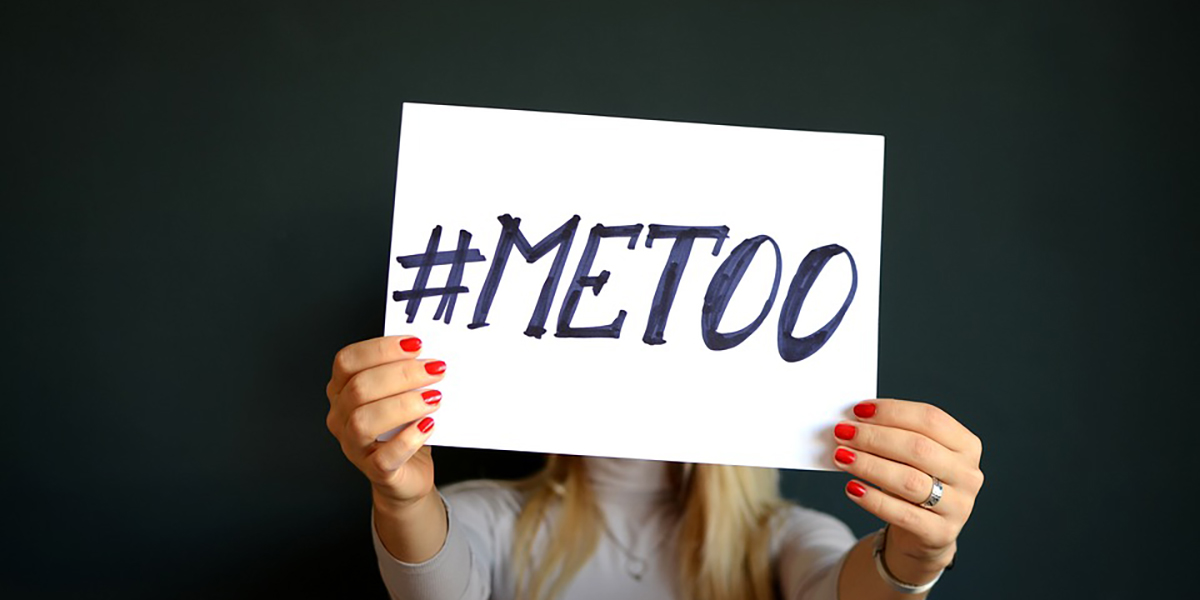Bill Cosby was sentenced to 3-10 years for several counts of sexual assault just days before Supreme Court justice Brett Kavanaugh had his hearing for an assault on Dr. Christine Blasey Ford over three decades ago. This is still news and will continue to be news until the issue is looked at with delicate but attentive eyes.
Copyright-free image
The #METOO shown above is the social media tagline streamlining the organization’s efforts in awareness and recovery for the abused.
__________________________________________________
The reality is the world is changing, and for men and women who felt nothing good would come if they reported their assault, they now have a reason to speak out. Me Too is the name of an organization, founded in 2006, to help aid survivors of sexual assault, primarily women of color; now, they have broadened their goal to helping all victims subjected to sexual assault. Many of the victims we see using the #MeToo share the same abuser, making the slogan that much more versatile and powerful against attackers. There are two sides to this Me Too era we’re currently in. The Me Too side is advocating for the future generation of victims who may feel that nothing good would come from reporting their assault, hoping to change the way victimhood is perceived, and advocating that it be obligatory to report the crime. This would dissuade the closed-minded from uttering unwelcome words toward those whose hearts are inclined to bravery, rather than deceit. The other side sees alleged victims who come forth after so long as disingenuous people who just want attention or money, and that there is no reason to ruin someone’s life over something that occurred decades ago. Both sides are justified in their views and deserve separate attention as well as an open-minded audience. The problem with this debate is how long our society has ignored it. For decades, victims have been shamed and blamed for their own assaults, simply because dealing with the aftermath of a sexual assault is hard work. Legally, emotionally, mentally, it damages both sides. So the entire situation gets buried and the victims are left with a life-changing memory of feeling dehumanized, scared and alone. This current movement has allowed thousands of cases from past assaults to resurface and at last be investigated. But how effective are these accusations, since there is rarely any physical evidence? Again, both sides have a valid argument. Most of these cases are, “he said, she said.” Prosecutors lean toward the defense due to the lack of evidence. Just because the case isn’t won doesn’t mean the damage isn’t done. The pure weight of one of these accusations can cripple a career and sever relationships due to the embarrassment and shame it brings. This can mimic the same embarrassment and shame that actual victims have after their assaults. Imagine the hundreds of dismissed cases where there were false accusations. A rape accusation is still a rape accusation in America. Your name will forever be accompanied with “accused of sexual assault.” The actual victims have done plenty of good with their powerful testimonies, revealing several big name offenders who would have continued their actions with no repercussions. Names like Bill Cosby, Larry Nassar and Harvey Weinstein. These men have done horrific things to over 447 victims. So for the #MeToo movement, keep speaking out. Keep putting offenders like these behind bars. Switching to the other side of this argument, those false accusers who think they can fake their way to a settlement and whose false accusations drastically diminish the validity of the Me Too movement, they are wildly underestimating the justice system. Simply saying you were attacked won’t do anything, so why do it, unless it is true? The name MeToo has been misinterpreted by many people as pairing false accusers with actual victims. It isn’t hard to tell a real victim from the rest, you just need to hear the story. The world needs to look at these cases more. It’s incredibly uncomfortable, but hearing testimonies from real victims could help people realize what it’s like to be abused and realize how hard it must have been to come forward. Here are just a few anonymous testimonials from both male and female victims, posted by The Washington Post. My words alone may not effect change, but hopefully they work as an introduction to your own efforts to help stop sexual abuse and false claims of sexual abuse. For anyone who needs more convincing, I’ve attached the video of Aly Raisman’s testimony in front of her abuser, Larry Nassar. Raisman is a two-time Olympian who won six Olympic medals as a member of the U.S. women’s gymnastics team, where Nassar served as the team doctor. Here is some of what she had to say. “The tables have turned, Larry. We are here. We have our voices, and we are not going anywhere. And now, Larry, it’s your turn to listen to me. “There is no map that shows you the pathway to healing. Realizing that you are a survivor of sexual abuse is really hard to put into words. I cannot adequately capture the level of disgust I feel when I think about how this happened.” And in closing, Raisman said: “My dream is that one day, everyone will know what the words ‘Me Too’ signify but they will be educated and able to protect themselves from predators like Larry, so that they will never, ever, ever have to say the words, ‘me too’.” As tears glisten from my keyboard, I hope these words help victims come forward. If nothing else, please remember that past and future victims didn’t ask for this, and we need to respect their bravery and honor their commitment to a battle that nobody wants to fight.
